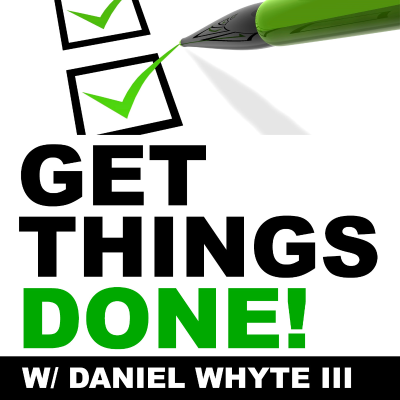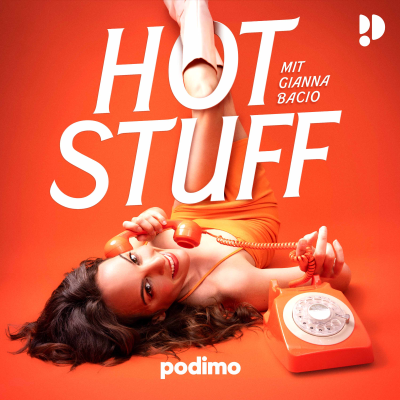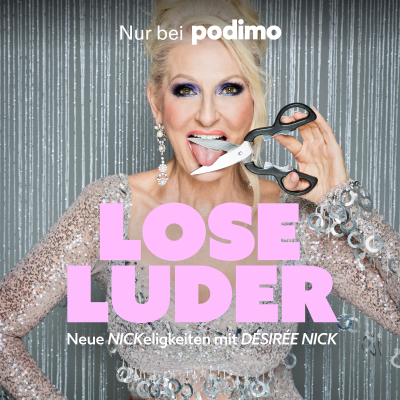
Get Things Done!
Englisch
Kostenlos bei Podimo
Kostenlos hören bei Podimo
Starte jetzt und verbinde dich mit deinen Lieblingspodcaster*innen
- Vertraut von über 1 Mio. deutschen Hörer*innen
- Über 1.000 lokale Podcasts und Shows – nur bei Podimo
- Keine Zahlung nötig
Mehr Get Things Done!
God has put each person on earth to do something great for His glory. The simple purpose of this podcast is to help you get things done every day so that you can accomplish something worthwhile with your life.
Alle Folgen
44 FolgenUse the Reinforcement Principle, Part 2
Romans 12:10-12 says: "Be kindly affectioned one to another with brotherly love; in honour preferring one another; Not slothful in business; fervent in spirit; serving the Lord; Rejoicing in hope; patient in tribulation; continuing instant in prayer;" Our quote for today is from Jim Rohn. He said: "Discipline is the bridge between goals and accomplishment." Today, in the Get Things Done podcast we are looking at Part 2 of Step 8: "Use the Reinforcement Principle". Q: Some people would argue that it's demeaning to "bribe" yourself to do something that you know you should do anyway. Shouldn't the satisfaction of a job well-done be reward enough? It often is. For many people the knowledge that they will earn self-satisfaction is sufficient motivation to get them to perform a distasteful task at the appropriate time. Such people have learned to utilize the most important reinforcer of all and are to be commended—if everyone were like them there would be no such thing as procrastination, a book like this one would never be written, and it would be a much different world. But many people aren't like that; they doubt they can do the job satisfactorily, or they are immobilized by anticipation of discomfort, or by shyness, or by fear of success, or by one of the other inhibitors we've talked about, so they postpone action. Such people may find it's necessary to sweeten the pot by providing some additional rewards. This can hardly be referred to as bribery, because that word implies something improper. After all, what's wrong with being rewarded? Welders and teachers and physicians do their work partly because of the satisfaction they get from doing it—but they usually don't continue very long unless that intrinsic reward is supplemented by some additional reinforcement, such as a paycheck, recognition, or benefits. ...
Use the Reinforcement Principle, Part 1
Psalm 90:17 says: "And let the beauty of the Lord our God be upon us: and establish thou the work of our hands upon us; yea, the work of our hands establish thou it." Our quote for today is from Samuel Butler. He said: "If we attend continually and promptly to the little that we can do, we shall ere long be surprised to find how little remains that we cannot do." Today, in the Get Things Done podcast we are looking at Part 1 of Step 8: "Use the Reinforcement Principle". Q: You have emphasized the power of self-discipline. But how do you make sure that when you discipline yourself to do something it isn't just a one-time thing? In other words, how do you build single actions into habit patterns, so that procrastination is less likely in the future? You do it by using the principle of reinforcement. Behavioral scientists have demonstrated that whenever a behavior occurs, the likelihood of it occurring again is strongly influenced by whatever happens immediately afterward. If the subsequent event is pleasant, the brain links the two occurrences together. Even if the person is unaware of the linkage, the behavior is more likely to be repeated. The process is seen throughout the animal kingdom: it is built-in mechanism that makes possible what psychologists call associative learning. So if you want a particular action to be repeated, follow it immediately with a suitable reinforcer, some kind of reward that will have a positive effect. The reinforcer may be provided by someone else—as, for example, in the case of a football coach who gives a player a pat on the back after he has made an exceptional effort—or you can provide it for yourself, as when you give yourself some kind of reward for performing an unpleasant task you were tempted to postpone. ...
Establish an Action Environment, Part 3
Ecclesiastes 2:24 says: "There is nothing better for a man, than that he should eat and drink, and that he should make his soul enjoy good in his labour. This also I saw, that it was from the hand of God." Our quote for today is from Samuel Butler. He said: "If we attend continually and promptly to the little that we can do, we shall ere long be surprised to find how little remains that we cannot do." Today, in the Get Things Done podcast we are looking at Part 3 of Step 7: "Establish an Action Environment". Having the necessary tools and materials close at hand and ready for action minimizes procrastination. For most tasks, gathering the necessary tools and materials is the vital first step. Nothing happens until you have the resources close at hand. Having everything organized. In a workshop, that may mean having a neat and orderly workbench with all tools in their allotted spaces and a clear space for the new project. In an office, a tidy desk, free of any extraneous materials, is generally an invitation to concentrate. Everyone has personal preferences regarding the layout of their workspace. For some, untidiness is reassuring and soothing. For others, a cluttered work environment leads to disorganized thinking. ...
Establish an Action Environment, Part 2
As we begin, let me give you this reminder from the Word of God. Psalm 37:5 says: "Commit thy way unto the Lord; trust also in him; and he shall bring it to pass." Our quote for today is from Ralph Marston. He said: "What you do today can improve all your tomorrows." Today, in the Get Things Done podcast we are looking at Part 2 of Step 7: "Establish an Action Environment". Q: You also mentioned that having things organized will help reduce the temptation to procrastinate. Exactly what did you mean by that? I mean that it important to avoid clutter in the workplace. A neat, orderly workbench, with each tool hanging in its allotted space, is an invitation to get busy, whereas a jumbled aggregation of wrenches, pipes, hammers, clamps, wire, files, pliers, sandpaper, and half-finished projects stifles enthusiasm and encourages delay and diversion. The same is true in an office. A tidy desk encourages concentration; a disheveled one is a psychological roadblock. ...
Establish an Action Environment, Part 1
As we begin, let me give you this reminder from the Word of God. Proverbs 22:29 says: "Seest thou a man diligent in his business? he shall stand before kings; he shall not stand before mean men." Our quote for today is from Dale Carnegie. He said: "Inaction breeds doubt and fear. Action breeds confidence and courage. If you want to conquer fear, do not sit home and think about it. Go out and get busy. " Today, in the Get Things Done podcast we are looking at Part 1 of Step 7: "Establish an Action Environment". Q: To what extent does the physical environment affect procrastination? In many cases, it plays a key role; in others it's a minor factor. But it will always encourage or discourage action to some degree, so it must be considered. Q: What environmental factors are most important in preventing procrastination? Two of the most important considerations are (1) to have the necessary tools and materials at hand, and (2) to have them organized. ...















































